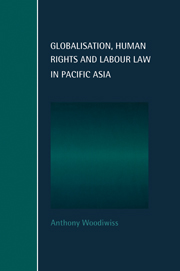Book contents
- Frontmatter
- Contents
- List of figures
- Acknowledgements
- CONVENTIONS
- Introduction: the ‘clash of civilisations’ and the problem of human rights
- PART ONE Against absolutism and relativism: towards a globally enforceable concept of human rights
- PART TWO Human rights, labour law and patriarchalism in Pacific Asia
- 3 The Philippines and mendicant patriarchalism
- 4 Hong Kong and patriarchalist individualism
- 5 Malaysia and authoritarian patriarchalism
- 6 Singapore and the possibility of enforceable benevolence
- Conclusion
- Notes
- References
- Index
5 - Malaysia and authoritarian patriarchalism
Published online by Cambridge University Press: 07 May 2010
- Frontmatter
- Contents
- List of figures
- Acknowledgements
- CONVENTIONS
- Introduction: the ‘clash of civilisations’ and the problem of human rights
- PART ONE Against absolutism and relativism: towards a globally enforceable concept of human rights
- PART TWO Human rights, labour law and patriarchalism in Pacific Asia
- 3 The Philippines and mendicant patriarchalism
- 4 Hong Kong and patriarchalist individualism
- 5 Malaysia and authoritarian patriarchalism
- 6 Singapore and the possibility of enforceable benevolence
- Conclusion
- Notes
- References
- Index
Summary
Malaysian society exhibits many of the social prerequisites deemed necessary if human rights are to be respected: well-established democratic institutions; success in economic development; a well-trained judiciary and legal profession; and an openness to judicial precedents created in well-established liberal-democratic jurisdictions. However, as it turns out, none of these prerequisites, whether considered singly or together, has prevented what would appear to have been a continuous derogation of human and labour rights in the post-independence period. Indeed, several of these ostensibly positive social characteristics have in fact contributed to the process of derogation (cf. Rubin, 1990). Given the Hong Kong experience, this derogation would not seem to be explainable by simply referring to Malaysia's increasing integration into the circuits of Pacific capitalism. Rather, it appears to have been the result of the manner in which this integration was achieved, which in turn was a product of the social exigencies and political possibilities created by the society's ‘racial’ or ‘communal’ diversity. At independence, 49.8 per cent of the population were Malay, 37.2 per cent Chinese and 11.2 per cent Indian. However, what the Malaysian case demonstrates very clearly is that neither successful economic development, the presence of liberal-democratic institutions nor their combination are sufficient to guarantee enhanced respect for human rights. Rather, what seems to be critical is the nature of the discourse of rule that animates these institutions and therefore the nature of this discourse's conditions of existence.
- Type
- Chapter
- Information
- Globalisation, Human Rights and Labour Law in Pacific Asia , pp. 185 - 215Publisher: Cambridge University PressPrint publication year: 1998



